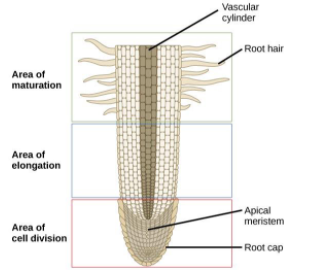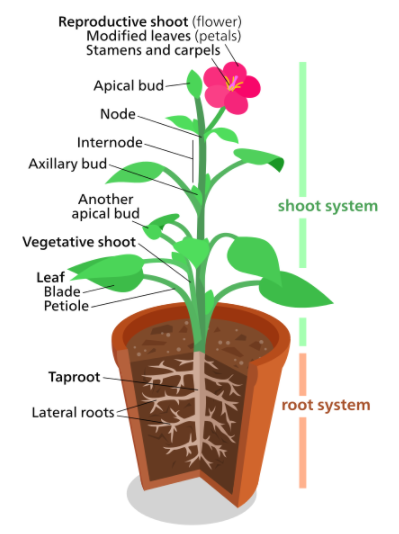
The process of mitosis can be studied in
A. Onion root tip
B. Garlic root tip
C. Tendril tip
D. All of the above
Answer
573k+ views
Hint: The cell division which increases the number of cells without any exchange of genetic material is Mitosis. Mitosis is dedicated to the growth and development of plants and animals. It makes clones of cells.
Complete answer:
Cell division is the basic requirement for the growth and development of the body, if the cells top dividing the body will eventually die. There are two types of cell divisions one occurs in the gamete cell and is necessary for reproduction as this cell division leads to genetic material exchange, this is meiosis or the reductional division whereas the other one is mitosis also known as equational division which occurs in the somatic cells of the body and this cell division is employed in the repair of the body and increasing the number of cells for growth and development.
In plants mitosis occurs in the meristems which have the ability to divide continuously. Meristems in plants are of two types: apical meristems which are present on the tips of roots and shoots and they help in the elongation of length of the plant. The other is lateral meristem which helps in increasing the width of the plant. Plants don’t repair or replace their damaged parts like leaves, branches but for new ones due to the continuous production of new cells in the meristems.
Hence, the correct answer is option (D).


Additional information:
-Apical meristem in roots is present at the tip of the root above the root cap and this root tip can be divided into different zone like the first one being the root cap itself then come the zone of cell division where all the cell division occurs, after this zone is the zone of elongation where the divided cells elongate and the last being the zone of maturation where the elongated cells mature by differentiating into different cells and develop into different tissues like the ground tissue, dermal tissue or the vascular tissue.
-Root cap protects the tip of the root having the apical meristem when the roots elongate themselves through the soil.
-The zone of elongation is the zone that is responsible for the elongation of roots as when the cells in this zone elongate they start pushing the roots far into the soil.
Note: Apart from the apical and lateral meristems intercalary meristems are also present at the nodes and internodes of the stem and at the base of the leaves. The primary aim of these meristems is to increase the length of the internodes and develop into branches.
Complete answer:
Cell division is the basic requirement for the growth and development of the body, if the cells top dividing the body will eventually die. There are two types of cell divisions one occurs in the gamete cell and is necessary for reproduction as this cell division leads to genetic material exchange, this is meiosis or the reductional division whereas the other one is mitosis also known as equational division which occurs in the somatic cells of the body and this cell division is employed in the repair of the body and increasing the number of cells for growth and development.
In plants mitosis occurs in the meristems which have the ability to divide continuously. Meristems in plants are of two types: apical meristems which are present on the tips of roots and shoots and they help in the elongation of length of the plant. The other is lateral meristem which helps in increasing the width of the plant. Plants don’t repair or replace their damaged parts like leaves, branches but for new ones due to the continuous production of new cells in the meristems.
Hence, the correct answer is option (D).


Additional information:
-Apical meristem in roots is present at the tip of the root above the root cap and this root tip can be divided into different zone like the first one being the root cap itself then come the zone of cell division where all the cell division occurs, after this zone is the zone of elongation where the divided cells elongate and the last being the zone of maturation where the elongated cells mature by differentiating into different cells and develop into different tissues like the ground tissue, dermal tissue or the vascular tissue.
-Root cap protects the tip of the root having the apical meristem when the roots elongate themselves through the soil.
-The zone of elongation is the zone that is responsible for the elongation of roots as when the cells in this zone elongate they start pushing the roots far into the soil.
Note: Apart from the apical and lateral meristems intercalary meristems are also present at the nodes and internodes of the stem and at the base of the leaves. The primary aim of these meristems is to increase the length of the internodes and develop into branches.
Recently Updated Pages
Master Class 12 Economics: Engaging Questions & Answers for Success

Master Class 12 Physics: Engaging Questions & Answers for Success

Master Class 12 English: Engaging Questions & Answers for Success

Master Class 12 Social Science: Engaging Questions & Answers for Success

Master Class 12 Maths: Engaging Questions & Answers for Success

Master Class 12 Business Studies: Engaging Questions & Answers for Success

Trending doubts
Which are the Top 10 Largest Countries of the World?

What are the major means of transport Explain each class 12 social science CBSE

Draw a labelled sketch of the human eye class 12 physics CBSE

What is a transformer Explain the principle construction class 12 physics CBSE

Why cannot DNA pass through cell membranes class 12 biology CBSE

Differentiate between insitu conservation and exsitu class 12 biology CBSE




